| After doing a
photoshoot with Tommy and Johnny in Manchester we spent some
time chatting about their musical backgrounds, their various
bands and their style of music.
Alan: What
are your first musical memories - Tommy, I think you grew up
Shropshire and Johnny somewhere in the North-West?
Johnny: Yes,
Runcorn.
Tommy: I grew
up in Hampshire. My musical memories are of my dad's country
and western and my mum's rock and roll.
Johnny: Not
something that was in the family really. It wasn't a
musical family, pretty much something that's just come to
me. And it was blues, it wasn't something that all my mates
were listening to, it was Bob Dylan, roots music and blues.
I don't really recall music being something that was around
the household.
Tommy: Mine's
the opposite. We had a lot of music on, a lot of rock and
roll, especially Elvis. My Dad's Boxcar Willie, all the old
Country & Western, not the modern.
Alan:
Did you always want to become a musician?
Tommy: No, I
was interested in most things that kids are I suppose but I
found music when I was 13 or 14.
Johnny: It was
not something that I ever thought of or dreamed of doing but
it was something that I couldn't escape once I felt what you
could do with the music; it was something you get hooked on
and it's so expressive that it becomes part of your life.
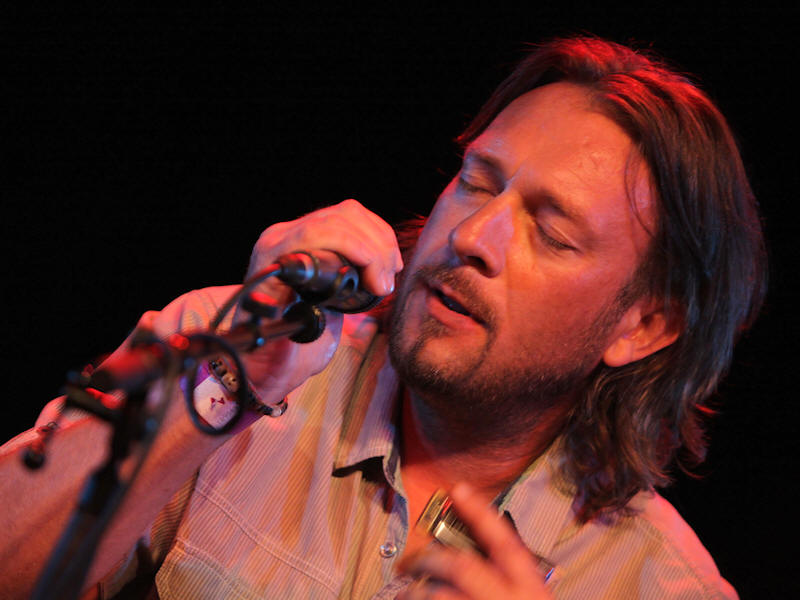
Alan: How
did you get started being musicians?
Johnny: I
didn't know any musicians when I started playing harmonica
and guitar. It came through socialising locally and going
to some local music nights, watching bands and gradually
meeting up with people. And then, at the time I was doing
an apprenticeship as a joiner at ICI and there was an old
shack that was being scrapped, an old cylinder shed in the
ICI grounds and my Dad bought it me for 10p, he just had to
sign a chitty to get it out of the gate. It's still at home
now, it's my Dad's wood shed now. It was Johnny's shack and
everyone in Runcorn knew it as Johnny's shack, it was just
in the hills by my Dad's house. I was the only harp player
but there were many guitarists and singers and from about
the age of 17 that place was bouncing.
Tommy: Once
I'd taught myself how to play I went busking when I was
about 16 or 17 and I used to save up the money for driving
lessons because that was the first thing you need to do as a
musician. From then, once I'd passed and got a little old
car I went into London to jam nights and networked. The
first band I got in was Marcus Malone when I was about 18
and I met him at a Robin Bibi jam night in South Wimbledon,
so I was gigging with him and then Nicky Moore got to hear
and I got a phone call so I joined Nicky's band. Then I
went as guitarist with the Sugababes The person who got me
into the Sugababes was at the same jam night but I hadn't
see him for ages but he remembered me. Then I got my own
band, and then bits and bobs onwards.
Alan: Tommy,
you attended the National Guitar Institute in London, when
you were 18. Tell me a little about those times.
Tommy: Yes,
that was at the same time when I joined Marcus.
Alan: And
then you decided to jack that in and go on the road?
Tommy: Yeah,
basically. I went there but it wasn't for me in the sense
that I played naturally. I know they are there to teach you
to read music but it was more fitting into a schedule and
they explained things which didn't make sense like BB King
would bend this note to a flattened third and I didn't think
they would have done that. So for me, I got the grant money
because I was from a single parent family and I got awarded
the grant, which is wrong, maybe, but with that money I
bought myself a Fender twin and joined a band and then
didn't go back to school.
Alan: So
what's your favourite guitar?
Tommy: The
only guitar I've ever had, my Fender Stratocaster.
Alan: Who
are your favourite blues artists?
Johnny: Yeah,
the classics really, Little Walter, Sonny Boy II, Big Walter
Horton, they're the greatest along with Sonny Terry. Modern
players are Kim Wilson, Bill Clarke, William Clarke, those
guys. Probably the greatest player now is Dennis Gruenling.
And really the West Coast players like Rod Piazza, and the
guitarists Alex Schulz, Junior Watson, always loved that
style. Fred Below the drummer, Muddy Waters as a singer,
just the real blues.
Tommy:
Living? BB King, and not just because of his playing but
everything he does, him as a person, the way he is. I love
his playing, his songs, the choices he's made over the years
with his music. But I also like Dell McClinton and John
Hiatt. I like Free, I like lots of people. And now that
I'm doing more acousticy things I like William Clarke (that
I'd never heard of till I met Johnny) and I'm more into
Little Walter and Sonny Boy Williamson but I preferred
Little Walter before I met Johnny. But now I do understand
Sonny Boy Williamson more, and I do appreciate him more.
And of the old guys I like Robert Johnson, Charlie Patton
and Blind Blake. Blind Blake is one of my favourite old
time players. There's loads but always for me there's BB
King, and Ray Charles, I like Ray Charles as well.
Alan: Where
did the two of you first meet up?
Tommy: Johnny
says I jammed with him at Pete Evan's Club with Smokehouse,
but I don't really remember that! I don't have a great
memory. So my first memory of Johnny is when he came and
saw Mojo Buford; you came to watch him play didn't you and I
think you played a bit as well. But before then Johnny says
I got up at Pete's Club and played guitar.
Johnny: Yeah.
when I was playing with Smokehouse Pete Evans gave us a good
break really, he's always been good to us and to me in
particular. He invited us down to play in the Festival and
as you know you have to go through the ranks, you play the
little stage first, then gradually we got to the main
stage. In that second year I remember Tom coming along and
getting up with the band, and as the years went by I think
the work for me went quiet (I've always worked full time)
and Tom was having a break from what he was doing and Pete
put us both together really.
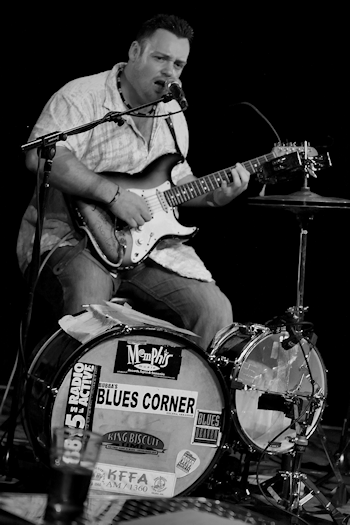 Tommy: Well, I
moved up to Shropshire about 5 years ago and we've been
together for about 4 and a half years. I didn't know any
musicians, any drummers or bass players to carry on with my
Trafficker band. So Pete introduced me, and talked about
the duo thing. And we downsized! Tommy: Well, I
moved up to Shropshire about 5 years ago and we've been
together for about 4 and a half years. I didn't know any
musicians, any drummers or bass players to carry on with my
Trafficker band. So Pete introduced me, and talked about
the duo thing. And we downsized!
Johnny: Yeah
we downsized, so we've got our drummer now ...
Tommy: Me
Johnny: And
our own snare player ...
Tommy: Me
Johnny:
Guitarist, singer ...
Tommy: Me
Johnny: I just
turn up and blow a bit of harp ...
Tommy: And
stamp his feet!
Alan: Tommy,
tell me about members of the Tommy Allen Band apart from
yourselves, Chris Lomas on bass and Micky Barker on drums,
is the band still going?
Tommy: It does
still go, yeah, but with times the way they are, the band
lives in Birmingham and I'm living in Shropshire and because
of the
issues with my son
[see below]
and looking after him during the week, I'm tied up a lot at
the moment so it's hard to do new things or get to them to
do new songs. So I feel a bit stunted or uncreative with
that. It still runs and we still do gigs but we are doing
the kind of things we were doing a while back. There's no
pushing it forward yet because of the way things are.
That's not to say that I'm not going to. With the Duo it's
more passionate because it's a lot more involved and more
cutback and it is more fun. No disrespect to the other two
but they've got other projects too so at the moment we
really just meet for gigs and then go away again, there's no
real connection in between that. With Johnny, we are
friends, we travel together, we enjoy what we do, we talk
about blues and spiritual stuff and other things and it's a
lot more in-depth, so it comes from a different place. Plus
we seem to be getting more work, maybe because that shows in
the way we perform.
Johnny: It
feels like a good path.
Tommy: So the
band is something I definitely want to do but I want to do
it in the right way, the best way I can. I've got plenty of
songs, I just don't have the time or the money or the things
to get to Birmingham to go through things with those guys.
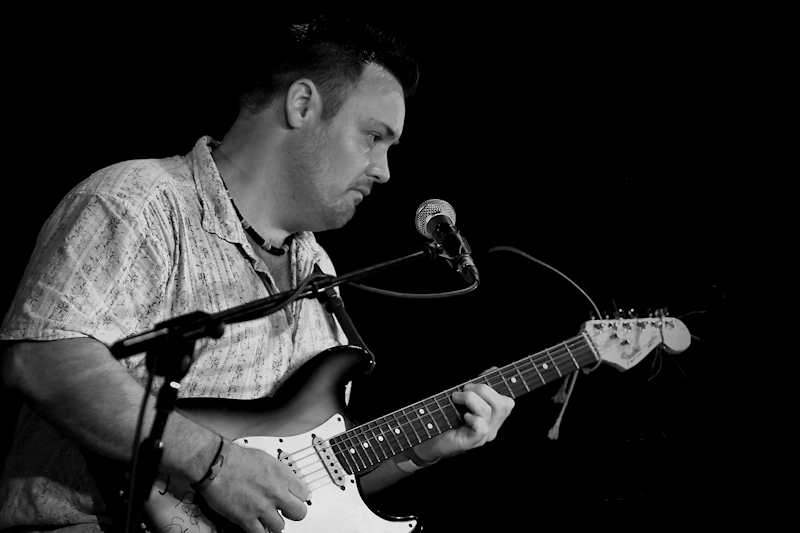
Alan: How
about Trafficker?
Tommy: We
still do gigs with me and Craig Bacon on drums. So
basically the Tommy Allen Band is more blues and rock and
roll, but Trafficker is more blues rock, not 12 bar sort of
songs. But basically the change of name was because I'd
just come more north, I might just drop the Trafficker name
and just use the Tommy Allen Band, I don't know,
Johnny: It
differentiates between the two styles though, doesn't it.
If people come to see the Tommy Allen Band they know they
aren't going to get Trafficker stuff.
Tommy: But I
still do a few gigs a year with Craig Bacon as Trafficker, I
still do a few gigs a year around Essex.
Alan: Johnny,
how about Smokehouse?
Johnny: We
don't do anything with Smokehouse now. Mainly because I
work full time and everything musically that I want to do
I'm quite content doing with Tom. It fulfils everything for
me and I try to keep a balance with my family and my work,
so I can't take anything more on. I wouldn't be putting
everything in, and if it's not all there then it's not good
enough. Also it's difficult now, some of the lads have
different jobs now, but I do love that band,. We did a
one-off gig recently with Tommy in Lymm and had a lovely
night, it was a sell-out.
Tommy: We
might be doing it again in October because of
the charity that I run
[see below]
so we're having a Boogie Blues night and we might do it with
his Smokehouse and me.
Alan: What
inspired you to come together and create The Blues Duo?
Johnny:
Firstly, it was the fact that we both had our bands and if
you are not playing them, then something else has to
happen. And that's basically what's happened, we
downsized. You only have to rely on each other. These are
the selfish reasons: the money goes further, not just in
your pocket but in mileage, fuel; you can travel together,
share digs, food, so you can survive better. You feel
better because you aren't struggling. Also, because it's a
new avenue for creation, because it comes down to a bit more
simplicity where Tommy could be playing something really
easy on his guitar and I could be playing some Sonny-style
harp and you are still getting that band-sized volume but
you've got so much more dynamics with the kick-drum and the
snare, and just to capture that whole feel. We could say,
"Let's do this track tonight" and we've never done it, we
don't have to rehearse it. We just pick a key we can knock
it out and if it works, we'll do it next time. So it's nice
and relaxed, we're enjoying it, it feels good.
Tommy: For me,
the instruments, really add. The first British acoustic
guys that I'd listened to, Eddie Martin, who had a one man
band, The Producers (Harry Skinner and Dave) that played
together, I liked the stuff they'd done, and Jim Crawford
whose singing and songwriting I really like. So when you
put them together with the Eddie Martin thing, that's
probably where I was heading before I met Johnny. I was
thinking of going down that line. I didn't play harmonica
but I was thinking of trying to do something with the drums,
guitar and make it as big as I can, because I've not got the
confidence to just stand there like Jim and just play guitar
and sing, even though that's what I'm working towards. So I
always have to have something going on, because I come from
playing 'big band' to playing just guitar, that's the only
way I can feel that I can hide behind it. But that
obviously come from those three guys. So I had that and
Johnny had his harmonica so when we got together we put our
own set together and that's how it grew.
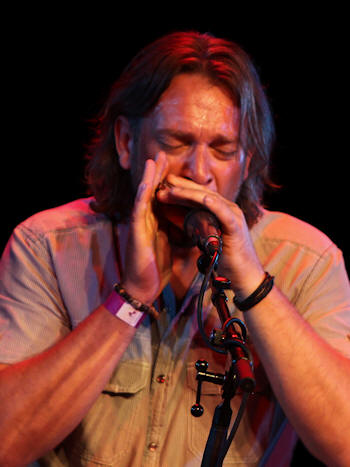 Johnny: And we
can share the vocals together, which is nice. Johnny: And we
can share the vocals together, which is nice.
Alan: Well, it's certainly working!
Tommy: And the
Maxwell Street vibe was because that's where our centre is
for the thing. I was working with Mojo Buford and I learnt
quite a lot about Chicago Blues style of things, and Muddy
Waters and the stories he used to say - him with Little
Walter and Sonny Boy and other people up there. There was
nobody else doing that so we thought it was great to be able
to keep that thing going, that raw Chicago. Most people see
"duo" and they just go out and strum their guitar, it's got
no energy. But the Duo does have the energy so we are
hoping that we could maybe be one of the guys who are
accepted on the big stage as a duo, not just playing small
clubs.
Johnny: We've
played main stages and we've played little cafe bars, and
it's so diverse.
Tommy: But
when we approach people, they suddenly slide you in at the
moment because they see the word "Duo", they don't know that
we are a big sound, we can have people dancing. So we are
hoping that we'll get accepted to play the bigger stages.
So, stick us on at a festival but don't always stick us on
that acoustic stage and see that you can have a Chicago
blues vibe on the main stage.
Alan: It
happened at The Carlisle Festival last November. You watch
people on stage and when it's finished, you go back to the
bar and there you were. And there were more people dancing
to you than at any other time during the festival. That was
an amazing night.
Tommy: We had
that in Holland as well. They stuck us outside but we got
three trips back just because of that one gig. Obviously it
was a good gig but we were shoved in a gazebo outside. It
just shows you that if they accept that, just because you
are a duo, you can play the big stage. That'll help us as
well because sometimes we are freezing cold outside!
Johnny: That
Dutch lager helps!
Alan: Tell
me about the making of your first duo CD 'The Blues Duo:
Live at Bronte Blues Club', how did you choose the
combination of tracks, the blues standards and your own
compositions?
Tommy: We knew
we wanted to do an album, but because of the costs as we
were only just starting out we didn't have the money to put
into doing one. This just worked itself out that the guy
would record that gig for a low fee and it's just a gig so
we didn't have to have a space, a studio, or anything. So
the recording worked out well and Johnny took it from there
and has built it into what it is, which is great now .
Johnny: The
songs that are on there weren't picked for choice, they were
picked as the ones that came out the best.
Tommy: We had
a few issues like the snare wasn't miked up .
Johnny: We'd
have another 3 or 4 tracks on there but the sound just
wasn't good enough.
Alan: It's
a great album, I love it.
Tommy: It's
good, and it gives us somewhere to grow from.
Alan: Tommy and Johnny, many thanks.
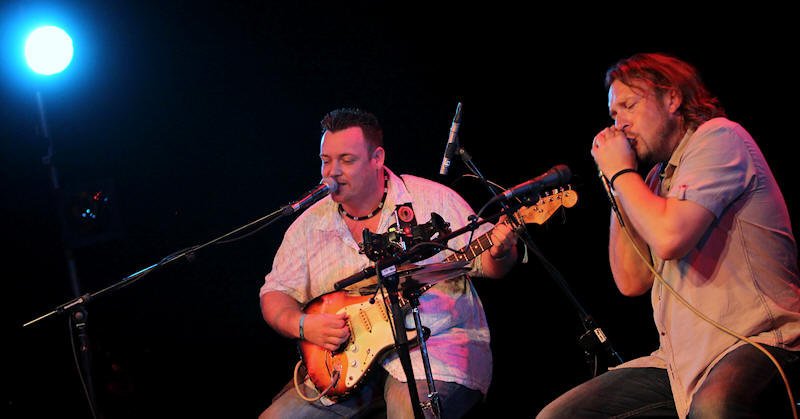
________________________________________________________________________________________________________________
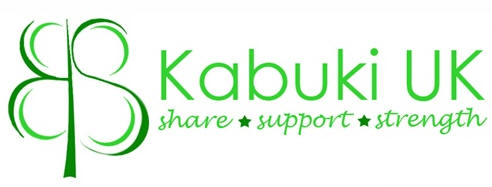
Tommy's son has a rare syndrome
called Kabuki Syndrome and he has set up a charity and support for all UK
families affected by Kabuki Syndrome. The charity is called Kabuki UK and you
can visit the website here:
www.kabukiuk.org.uk
Take a look around the website ... read the stories ... visit the shop ...
browse the fundraising events ... you can also donate through the website
...
www.kabukiuk.org.uk
|